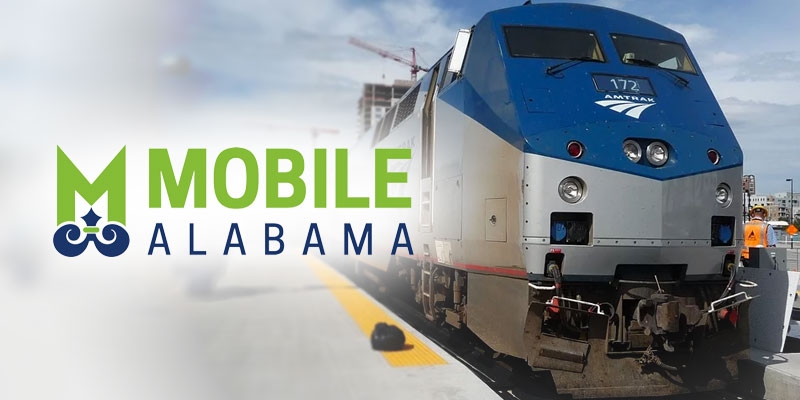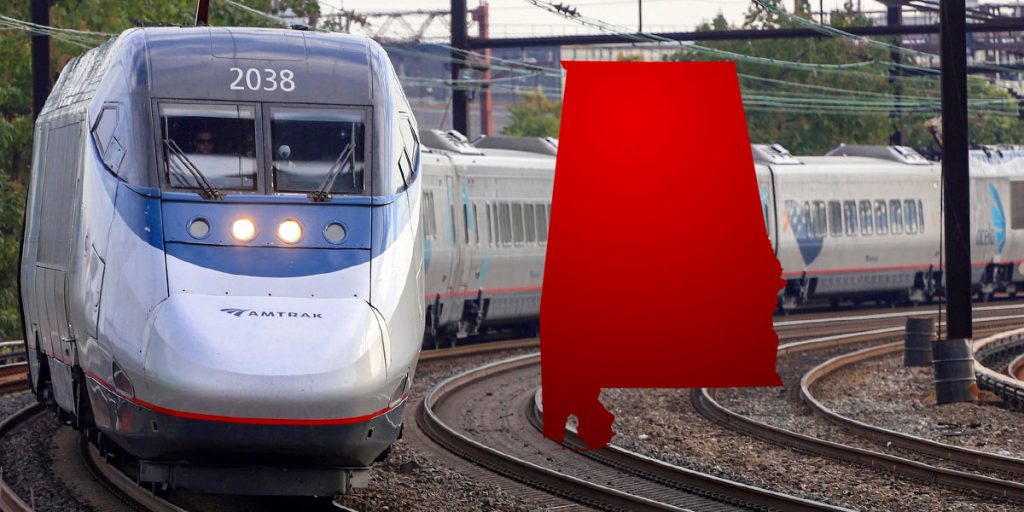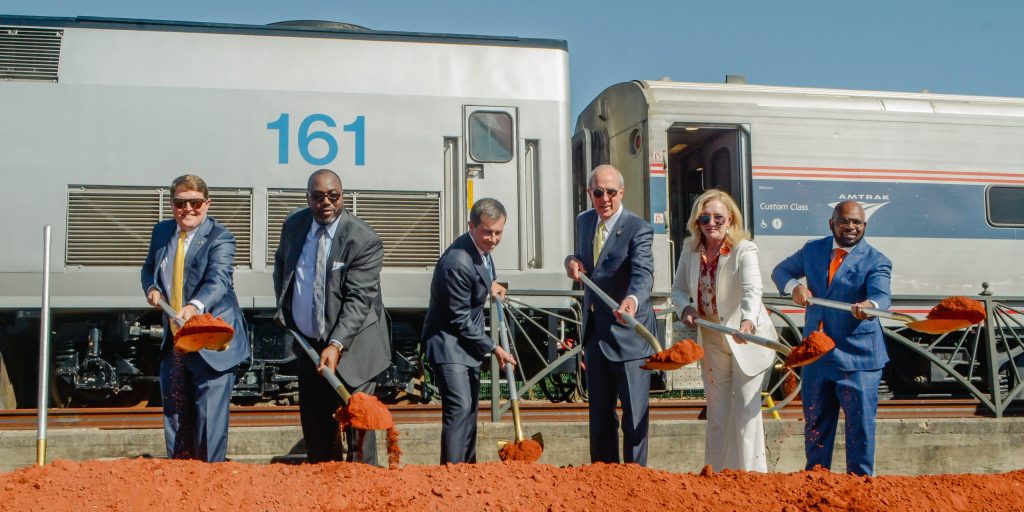More than $2 billion has recently been invested to grow and enhance the Port of Mobile, which already contributes over 150,000 jobs and $25.4 billion in economic impact as Alabama’s seaport.
However, that value — and the Port’s status as one of the nation’s fastest growing seaports — is now in jeopardy.
Yellowhammer News began reporting in fall 2019 that the Gulf Coast Passenger Rail project was a potential detriment to the Port of Mobile; the proposal would have two Amtrak passenger trains daily utilize CSX’s existing mainline from the west into downtown Mobile then back west (ultimately traveling to New Orleans).
The Alabama State Port Authority utilizes that line, and it also supports crossings for both the Port Authority’s railroad (Terminal Railway) and five other railroads entering the Port’s main dock terminals, the container intermodal rail terminal and the soon-to-be-constructed finished automobile terminal.
Under federal law, all of that important freight traffic would have to yield to Amtrak’s passenger service. This is why CSX, the Port Authority and the diverse industries that rely on the Port for transporting goods have been asking for an impact study to be completed that would assess infrastructure needs to accommodate passenger rail and any impact on existing freight rail service.
CSX, Norfolk Southern (which owns tracks elsewhere on the proposed route) and Amtrak ultimately agreed on the parameters of the study, which got underway in spring 2020.
Unfortunately, according to two letters obtained by Yellowhammer News, Amtrak in recent weeks decided to end the study before its completion while also announcing the rail service from Mobile to New Orleans would begin next year.
In a letter to Southern Rail Commission (SRC) Chairman Wiley Blankenship (one of Alabama’s delegates on the SRC), Port Authority CEO John Driscoll asked that the SRC “Alabama delegation stand firm in demanding Amtrak complete [the study].”
Alabama’s other delegates to the SRC are Stephen McNair, David Clark, Toby Bennington, Steven Brom and John Clyde Riggs.
Driscoll advised that the study was within two months of completion before Amtrak decided to cancel it; the Port Authority on February 10 asked Amtrak to resume and complete the study, but has reportedly not received a response.
“Alabama’s SRC Commissioners are keenly aware of the public and private investments at Alabama’s only seaport,” wrote Driscoll. “It is established that many of the state’s manufacturing, agribusiness, and retail/distribution growth is tied directly to Alabama’s seaport and its supporting rail infrastructure. … The economic value of business and industry across the entire state of Alabama, and that of its seaport, far exceeds the identified jobs and economic value tied to Amtrak’s goal of 38,000 annual riders.”
“The Alabama State Port Authority has clearly stated it would not oppose passenger rail, if the [freight rail impact] study and supplemental engineering assessment are completed and the necessary infrastructure is put in place to accommodate both freight/container intermodal and passenger services,” he continued. “We ask the SRC’s Alabama delegation, during the SRC’s March 5, 2021 commission meeting, represent this state’s interest by withholding support of Amtrak’s initiation of service in January 2022, and by asking Amtrak to finish the study.”
Driscoll also attached a letter from the Alabama District Export Council to Governor Kay Ivey. A host of trade associations and companies from various industries around the Yellowhammer State signed onto this letter; this includes the Business Council of Alabama, Alabama Farmers Federation, Manufacture Alabama, Alabama Forestry Assocation, Alabama Mining Association, Alabama Railway Association, Economic Development Association of Alabama and Mobile Area Chamber of Commerce.
“The ADEC and the listed business interests ask Alabama’s Congressional delegation, the State of Alabama, and the City and County of Mobile to send a strong message to Amtrak by withholding public subsidy for this proposed project,” Alabama District Export Council Chairman Michael Lee wrote. “We further ask your support in asking Amtrak to live up to its promise of working with the other parties to complete the study work necessary to demonstrate the full impact of passenger rail on Alabama’s seaport and the state’s diversified commercial interests.”
Amtrak’s cancellation of the impact study comes after a proponent of the project downplayed the importance of the Port at a Mobile City Council committee meeting early last year.
Judith Adams, spokesperson for the Alabama State Port Authority, released a statement last Friday lamenting Amtrak’s stance.
That statement in full reads as follows:
The Alabama State Port Authority is deeply disappointed in Amtrak’s decision to bypass the necessary study requirements to initiate new service on the CSX mainline in Alabama. On February 10, 2021, Amtrak informed the Port Authority that the study expired and it would discontinue the Rail Traffic Control (RTC) study citing funding shortfalls and study delays. The Port Authority understood the RTC portion of the study was 2 months from completion. The Port Authority oversees the public terminals at the Port of Mobile, one of the nation’s larger seaports. Our public terminals are served by eight railroads in addition to the CSX. All rail traffic supporting import/export activities at the public terminals must cross the CSX. The Port Authority’s Terminal Railway also travels the single track CSX mainline to serve the container intermodal complex and McDuffie Terminal. With over $1.3 billion invested in public terminals and the federal channel, the cargo and vessel activities of the Port Authority’s terminals generates over 150,000 jobs and $25.4 billion in economic value. It would be interesting to know how passenger rail’s economic impact compares.
It is unfortunate that Amtrak continues to tell the public that the “parties have walked away from the study.” The truth is that Amtrak has walked away from the study. Attached are CSX and Norfolk Southern Letters to ASPA advising they have asked Amtrak to return to and complete the study.
The chair of the Southern Rail Commission, Wiley Blankenship, Mobile, Ala, invited the Port Authority to today’s Southern Rail Commission meeting held via Zoom and chaired by the delegate from Louisiana. Mr. Blankenship could not attend due to a prior engagement, but David Clark and Stephen McNair did attend. The Alabama delegation is supporting its port. Mr. Clark did ask Amtrak to finish the study. He did not get a response. Mr. John Spain, the acting chair of the SRC and delegate from LA, acknowledged Mr. Clark’s remarks noting the SRC’s earliest mission statement was “it has to work for the freights as well as the passenger service.” An invitation was extended to John Driscoll, director and CEO of the Port Authority, so the Port could ask (in public forum) the Commission to support the study and ask Amtrak, who was presenting at the meeting, to return to the study. Mike Lee, chair of the Alabama District Export Council was also in attendance ready to ask this same question. The meeting did not afford for public comment or questions, albeit Zoom platforms allow two way communications. Instead, the attending public and media were told to direct their questions or comments to Amtrak after the meeting.
Clark, president and CEO of Visit Mobile, said during the SRC meeting last Friday, “We commissioners have consistently stressed on record that we support passenger rail service — as long as it does not interfere with commerce coming in and out of the state port.”
“We believe that the restart of this service along the Gulf Coast is predicated on the Port’s and Mr. Driscoll’s questions being answered in a satisfactory manner,” he added. “And again, I’m going to say that we look forward to the return of passenger rail service; it’s just conditional on the completion of the [freight rail impact] study before any action is taken by any party.”
Sean Ross is the editor of Yellowhammer News. You can follow him on Twitter @sean_yhn











